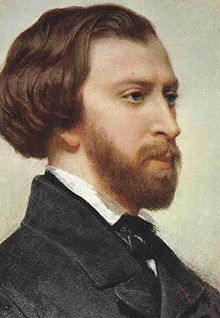Alfred de Musset
| Alfred de Musset | |
|---|---|

Musset painted by Charles Landelle.
|
|
| Born | Alfred Louis Charles de Musset-Pathay 11 December 1810 Paris, France |
| Died | 2 May 1857 (aged 46) Paris, France |
| Occupation | Poet, dramatist |
| Nationality | French |
| Literary movement | Romanticism |
|
|
|
| Signature |  |
Alfred Louis Charles de Musset-Pathay (French: [al.fʁɛd də my.sɛ]; 11 December 1810 – 2 May 1857) was a French dramatist, poet, and novelist. Along with his poetry, he is known for writing the autobiographical novel La Confession d'un enfant du siècle (The Confession of a Child of the Century).
Musset was born in Paris. His family was upper-class but poor and his father worked in various key government positions, but never gave his son any money. His mother came from similar circumstances, and her role as a society hostess – for example her drawing-room parties, luncheons and dinners held in the Musset residence – left a lasting impression on young Alfred.
Early indications of Musset's boyhood talents were seen by his fondness for acting impromptu mini-plays based upon episodes from old romance stories he had read. Years later, elder brother Paul de Musset would preserve these, and many other details, for posterity, in a biography on his famous younger brother.
Alfred de Musset entered the lycée Henri-IV at the age of nine, where in 1827 he won the Latin essay prize in the Concours général. With the help of Paul Foucher, Victor Hugo's brother-in-law, he began to attend, at the age of 17, the Cénacle, the literary salon of Charles Nodier at the Bibliothèque de l'Arsenal. After attempts at careers in medicine (which he gave up owing to a distaste for dissections), law, drawing, English and piano, he became one of the first Romantic writers, with his first collection of poems, Contes d'Espagne et d'Italie (1829, Tales of Spain and Italy). By the time he reached the age of 20, his rising literary fame was already accompanied by a sulphurous reputation fed by his dandy side.
He was the librarian of the French Ministry of the Interior under the July Monarchy. During this time he also involved himself in polemics during the Rhine crisis of 1840, caused by the French prime minister Adolphe Thiers, who as Minister of the Interior had been Musset's superior. Thiers had demanded that France should own the left bank of the Rhine (described as France's "natural boundary"), as it had under Napoleon, despite the territory's German population. These demands were rejected by German songs and poems, including Nikolaus Becker's Rheinlied, which contained the verse: "Sie sollen ihn nicht haben, den freien, deutschen Rhein ..." (They shall not have it, the free, German Rhine). Musset answered to this with a poem of his own: "Nous l'avons eu, votre Rhin allemand" (We've had it, your German Rhine).
...
Wikipedia
